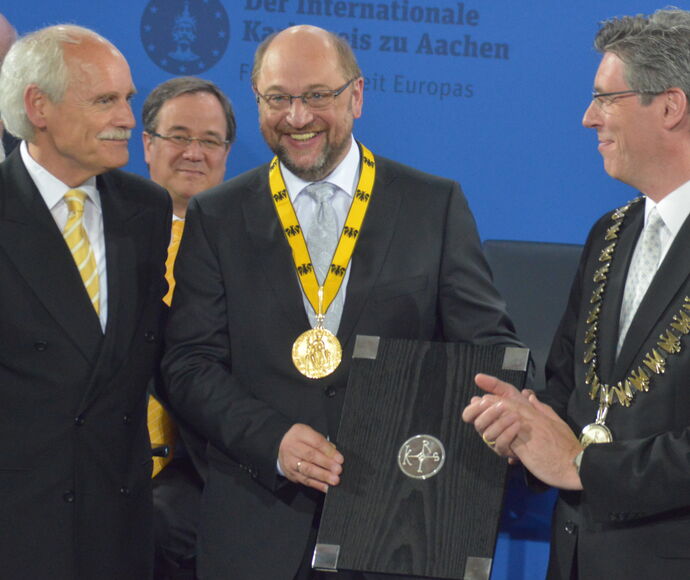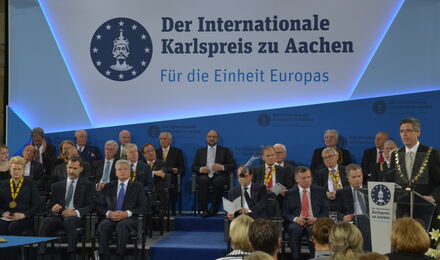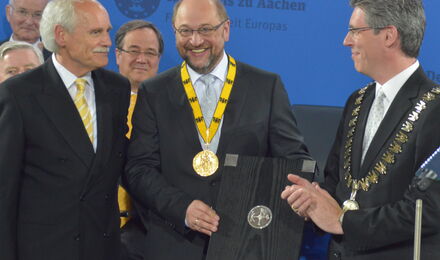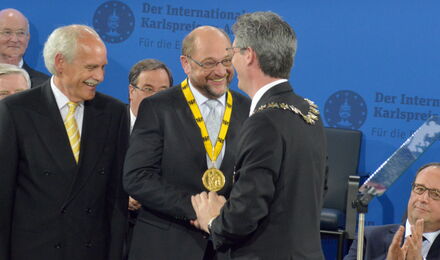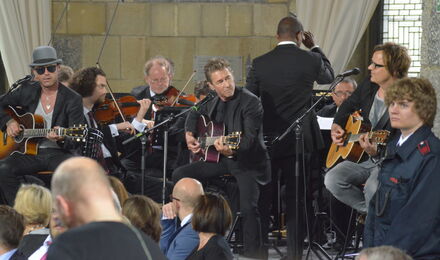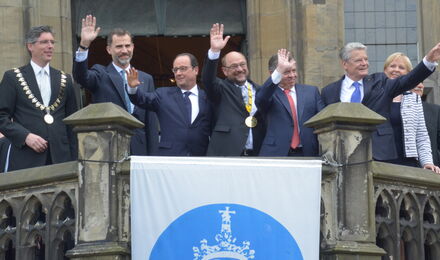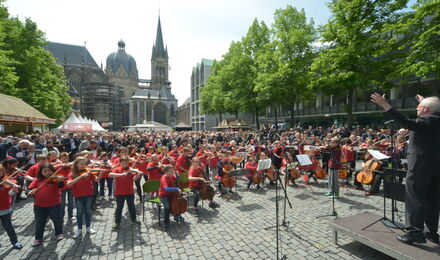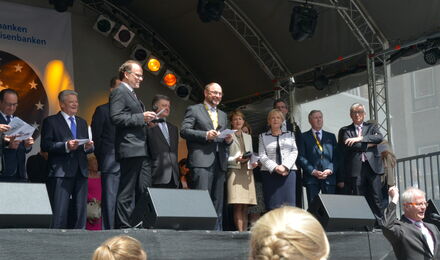Statement of the Board of Directors of the Society for the Conferring of the International Charlemagne Prize of Aachen on the President of the European Parliament
The decision taken in 2014 on the new Commission and the role of the European Parliament was a historic milestone for the democratisation of the EU. The question of whether and to what extent the vote of the electorate would influence the EU's personnel policy decisions was far more important than the person of the Commission President or other members – and thus the fundamental question of what form of democracy we want in and for the European Union. And while lawyers and commentators are still discussing how the Lisbon Treaty is to be interpreted, according to which the Council ‘takes into account’ the results of the European elections when proposing the election of the Commission President, the European Parliament has long since decided this question with the decisive and vocal commitment of its President. It has accepted only one candidate whose mandate is also legitimised by the people.
In appreciation of his significant services in strengthening parliamentarisation and democratic legitimation in the European Union and in recognition of his role as an important pioneer of the EU, the Board of Directors of the Society for the Conferring of the International Charlemagne Prize of Aachen honours the President of the European Parliament, Dr. h.c. Martin Schulz, in 2015.
‘Democracy needs debate. Visibility needs debate. Not for its own sake, but to achieve the best possible result. Because debate reveals alternatives. [...] Yes, I am trying to make the European Parliament more of a place of debate during my term of office – I am doing this consciously so that the institution as a whole and European democracy benefit.’ When Martin Schulz talks about his understanding of the role, it quickly becomes clear that he always wanted to be a president who ‘if necessary, fights for the respect of the executive branch for the parliament, takes on the establishment when the interests of the citizens are endangered’ and declares war on anyone who ‘believes that more Europe can be achieved with less parliamentarism’. Martin Schulz strengthens representative democracy, takes the concerns of European citizens seriously and thus strengthens the population's identification with Europe.
Martin Schulz was born on 20 December 1955 in Hehlrath (now the town of Eschweiler) near the German-Dutch-Belgian border. After leaving school with O-levels in Würselen, he completed an apprenticeship as a bookseller from 1975 to 1977 and worked in various bookshops and publishing houses. In 1982, he set up his own bookshop in Würselen (until 1994).
He joined the SPD in 1974 and in 1984, as a representative of the Social Democrats, he was elected to the Würselen town council for the first time. In 1987, the then 31-year-old was elected as the youngest mayor in North Rhine-Westphalia (until 1998). ‘That time,‘ Schulz recalls, “shaped my enthusiasm for Europe and strengthened my conviction that I wanted to help shape and advance the ”Project Europe’.’ The young head of the city consistently expanded the city partnership with the French town of Morlaix. The fact that the polyglot President of the European Parliament speaks fluent French in addition to English and Dutch may have stood him in good stead.
In 1994, he was first elected to the European Parliament, where he initially served as coordinator of the Socialist Group in the Subcommittee on Human Rights (1994-1996), and later as coordinator in the Committee on Civil Liberties, Justice and Home Affairs (1996-2000).
In 1999, he was responsible for the SPD's European election campaign, having since left the mayor's office. In the same year, he was elected to the federal executive and the presidium of the Social Democrats. In 2000, he took over the chairmanship of the 35-member group of SPD members of the European Parliament, and in 2002 he also became deputy chairman of the Socialist Group.
In November 2003, he was elected as the SPD's lead candidate for the European elections the following year, with over 98% of the vote. Although the German Social Democrats suffered a defeat in June 2004, Schulz was elected by an overwhelming majority as leader of the Socialist Group, which had grown to 200 members, and thus definitively advanced to become one of the key figures in the European Parliament.
The self-image – and self-confidence – that Schulz associated with his new office became clear just a few months later during the appointment of the Barroso Commission. After the conservative Italian Rocco Buttiglione, as candidate for the Commission's justice and home affairs portfolio, failed to win a majority in his hearing before the parliamentary committee responsible, and other candidates had also failed to convince, Barroso initially stuck to his preferred choice and risked a power struggle with Parliament. Together with his colleagues from the Green and Liberal factions, Schulz organised the resistance and threatened to refuse to approve the entire Commission. It was only a few hours before the planned vote that Barroso finally relented and asked for a postponement to make a new proposal. In a move unprecedented in EU history, the Parliament had refused to allow a designated Commission to take office and forced it to be reformed. While the media concluded that ‘Europe's balance of power is shifting’, Schulz spoke simply of a ‘victory for democracy’ and Barroso was finally forced to recognise ‘that this Parliament [...] plays a vital role in the governance of Europe’.
After the 2009 European elections, in which the Würselen native once again stood as the SPD's lead candidate, he was confirmed as the leader of the (now renamed) Progressive Alliance of Socialists and Democrats in the European Parliament (S&D). At the national level, he was given additional weight by being appointed by the SPD executive committee as its representative for the European Union. The high point of his political career so far came on 17 January 2012, when the European Parliament elected him as its president in the first round of voting, succeeding Jerzy Buzek. In his inaugural address, the ‘eloquent European’ (Jürgen Habermas on Schulz) made it clear that he would oppose ‘the continuing trend of summit fixation and renationalisation’ and wanted to help ‘negotiate with the Council on an equal footing’ and ‘make the Parliament more visible and audible as a place of democracy and controversial debate on the direction of EU policy’.
In his inaugural address to the European Council, he called for ‘the Parliament to participate in all Eurogipfeln and European summits’ and at the same time introduced his ideas for the introduction of a transaction tax, a European Rating Agency and a European growth initiative.
The growing importance of the European Parliament was subsequently demonstrated, among other things, in the discussions and resolutions on the multi-year financial framework 2014-2020, banking supervision and the single resolution mechanism, the financial transaction tax and – perhaps the most prominent example – in July 2012 in the broad rejection of the Anti-Piracy Treaty (ACTA), the wording of which, in the opinion of many, would have opened the door to abuse.
Schulz himself has meanwhile made a name for himself as one of the most prominent leaders in the EU – be it at the Nobel Peace Prize ceremony for the European Union, which he used for an emblematic visit to the island of Utoya to commemorate the young people who fell victim to an extreme right-wing mass murderer a year earlier; be it in the Greek parliament, which he visited only a few weeks after his election to pay his respects to the representatives of the Greek people; or in the Knesset, where he made a clear commitment that the EU would always stand by Israel's side, but also did not avoid difficult topics in his speech; or – time and again – at the meetings of the European Council, where he represented the interests of the only directly elected EU body. He repeatedly involved the European representatives in the important decisions of the EU: the crises surrounding the stability of the euro, the conflicts surrounding the Eastern European bridge states, the armed conflicts in the Middle East, the refugee problem – but also the peace initiatives of the Pope, the OSCE and others, and the efforts to improve the EU's relations with other continents.
Schulz is not trying to set the three main Brussels institutions against each other: ‘By continuing the institutional debates, we are only playing into the hands of those whose declared aim is to destroy the EU in its current form. [...] That is why I say: we can start a fresh start for European democracy within the existing framework, without a new European treaty or a constitutional convention and without going through a long ratification process.’
In a speech at Humboldt University in Berlin in May 2012 – and in even greater detail in his book ‘The Caged Giant’, which was published a year later – Schulz described an important building block for such a fresh start: ‘It is crucial that the European parties each put forward their pan-European lead candidate for the 2014 European elections, who will stand for the post of Commission President. After the election, the Commission President will be the person with a majority in Parliament.’
Schulz is today an outstanding representative of the revival of European democracy.
While earlier European elections, as Jürgen Habermas once polemicised, ‘were distorted out of cowardice in the face of unpopular topics into showdowns over national issues and over people who were not even up for election,’ Schulz wanted to promote the European debate on European issues through the Europe-wide lead candidates, in which clear alternatives for EU policy would emerge for the voters. ‘Instead of conjuring up the supposed ‘Europe without alternative’ and freezing in outdated pro and contra rituals, we should start a debate with the headline: ‘What kind of Europe do we want?’ Such a debate has a future dimension and does not remain in silent awe of the fateful European past.’
When the social democratic parties of Europe officially nominated Schulz as their first joint lead candidate in the history of the EU on 1 March 2014, he had long since put the other party families under pressure to also agree on a candidate for the office of Commission President for the European elections.
As a result, the word ‘lead candidate’ found its way into many European languages, and while European election campaigns had previously been conducted almost exclusively at the national level, in 2014, for the first time, joint leaders of the European party families competed in public debates on the political direction in Europe – and for a majority to form a commission.
After the EPP's victory, Jean-Claude Juncker was – logically – elected as the new Commission President. And even though Martin Schulz did not achieve his personal election goal, but instead became the first President of the European Parliament in the history of the EU to be re-elected for a second term, he was able to claim that ‘what we had begun with the process of the lead candidates had been brought to a good end. [...] Together, the European Council and the European Parliament have managed to usher in a new democratic era in the European Union. By establishing a new constitutional practice, and without having to amend the European treaties.’ – A constitutional practice that makes the election of the Commission President by Parliament a real political choice and thus gives the European executive a strong mandate not only from the heads of state and government, but above all from the people and their directly elected representatives – a democratic achievement that Parliament will no longer allow to be taken away from it.
In the President of the European Parliament, Dr. h.c. Martin Schulz, the Board of Directors of the Society for the Conferring of the International Charlemagne Prize of Aachen honours an outstanding pioneer of a united Europe who has rendered significant and lasting service to strengthening the Parliament, parliamentarianism and democratic legitimacy in the EU. President Schulz has given an important impetus to the European idea. It is important to strengthen this idea for the future as well.




